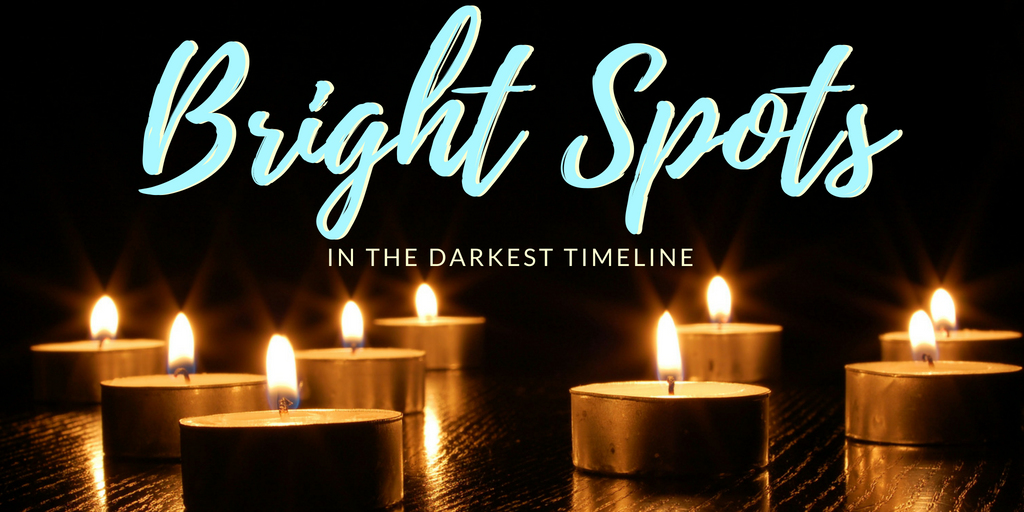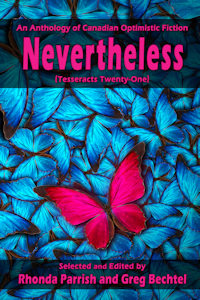When Brian Hades and I were discussing themes for Nevertheless (Tesseracts Twenty-one) one of the possibilities he suggested was optimistic speculative fiction. I pounced on that idea for two reasons. First, because I’d just recently become aware of solarpunk (largely through Sarena Ulibarri) and was excited to work on an anthology that might include some and second… because I’d become convinced that we were living in the darkest timeline. That was in 2016. I had no idea how much darker it could become.
Still, despite a very difficult couple of years, I manage to find reasons for optimism. Lights in the darkness. And I’m not alone in that.
In the coming weeks I will be hosting a series of blog posts I’m calling “Bright Spots in the Darkest Timeline”. Each will be written by a Nevertheless (Tesseracts Twenty-one) contributor and I think they will serve the dual purpose of giving me an excuse to talk about the anthology, and shining a bit of light into people’s lives.
Today we begin with this contribution from Natalia Yanchak about shifting how we think and approach things.
How to Repurpose a Diss
By Natalia Yanchak
I’ve been mostly self-employed throughout my life, so taking a part-time job was a big change. The decision set my work-life balance askew — or, I considered, the regular pay cheque might recalibrate my life-life balance. Not to say my decades-spanning career in rock and roll wasn’t work, it just never really felt as such.
Now I’ve committed to going in to an office, and managing said office, several times a week. I ride public transit with commuters and have to run errands on the weekend—along with the crowds and everyone else. I promised myself this would be temporary. My band would be making another album and have to tour again in a few years. But for now, I can be normal-core.
At risk of sounding like clickbait, you won’t believe what happened next! The show that was coming to the gallery (did I mention the office was situated in a non-profit art gallery in Tiohtià :ke/Montreal?) would put my optimism to the test.
Part of my new job is being available to visitors of the space. I have to greet them and be able to answer their questions about what is being displayed or presented. This generally requires learning about the work via a walkthrough with artists and curators, or a group reading. In the case of nènè myriam konaté’s curatorial residency “yes, and… also”, gallery employees were invited to a closed reading and discussion of Naomi Klein’s Leap Manifesto — a call to action for economic restructuring and basic equalities for all Canadians.
Part of nènè’s residency included a challenge to only converse in positive terms. Their residency was partially an experiment on how to effect positive change. How intersectionality and improvisation can lead to radical openness, requesting that we “stand firmly in our yes’s + that we ask ourselves why.”
When chatting in the space, nènè would kindly reminded me to reword negative language. It was harder to “stand firmly in my yes’s” than I thought. When wanting to challenge a point in our group reading of the Leap Manifesto, I would begin to speak, then pause and reflect: “How do I criticise with something in a positive way?”
It is doable, but requires forethought. To be positive and optimistic we must defy our innate training towards cynicism. We lean too much on our competitiveness. We puff ourselves up by denigrating others, where this exercise curated by nènè planted the seed that it was possible to speak positively about, say, even the hugest asshole. Those negative thoughts only help to cast an outward, negative vibe.
—
The inspiration behind my story, “Lt. Andrewicz Goes Apple Picking” is simple: as I waited to pick up my son from daycare, I looked over the photos from a recent field trip to an apple orchard. I couldn’t spot my boy in any of the shots, but I knew he was there: he came home with a sack of apples that day! So where was he? Enter my imagination.
Enter, also, the concept of parenthood, enter the primal bond one develops with their children. Enter the terror of thinking that one day your child might not need you. Then the doubt: Have I done my best? Have I given them the emotional and critical tools they might need to handle whatever life throws at them?
This is where positive vibes come in handy, where the simple task of equipping the people around you — young and old — with a sense of purpose effects positive change. Take pause to work out how that would sound. Come up with something inspiring about someone, even if it’s behind their back, even if you never tell them.
Could you imagine, a day without sending or receiving a single microaggression? Try it for an afternoon. Judge and disagree in solely positive terms: express what would you like to see, instead of ranting about what you didn’t like. Reframe that negative idea, repurpose that diss, and manifest the future, the yes’s, that you want.

Natalia attended Concordia University’s Creative Writing program. After graduation, she toured internationally as keyboardist and singer with The Dears. She writes speculative fiction in Tiohtià :ke/Montreal, where she lives with her husband and two children.
Author photo credit: Richmond Lam



As a university prof and as an editor, I’ve always tried to find something positive to say about student/client submissions, but with some manuscripts, it sometimes felt like the only positive thing I could find to say was “nice typeface”. I mean, it’s hard to correct people’s mistakes and be really positive, so I’ve maybe had the reputation of being a bit, well, brutal. But then recently I had the experience of working with an editor on one of my own manuscripts where she would say, “wow! best submission ever! Loved it. Now, if we could just make one or two tiny refinements, we could raise this up to the next level” and then proceeded to make ‘a few minor suggestions’ which consisted of changing essentially every word. (Okay, slight exaggeration, but you get the idea). And it was a fabulous experience. I would work with that editor again in a second. I learned so much! I not only improved that story, I think I learned how to take those lessons forward to the next manuscript. So that has given me pause to think re my own editing style. Sometimes blunt is more helpful than skirting around an issue as can happen with those who are afraid to tell the client when they are being stupid, but um…maybe I could find a better way to phrase my comments to be more like that kindy but helpful editor…. So yeah, I totally believe this editorial.